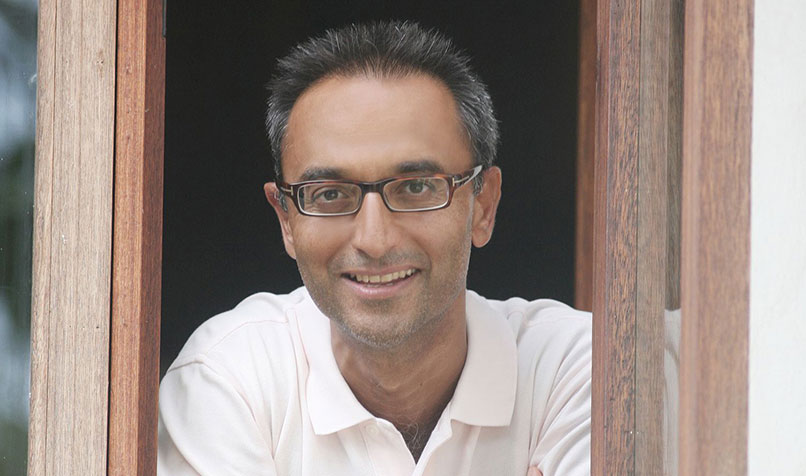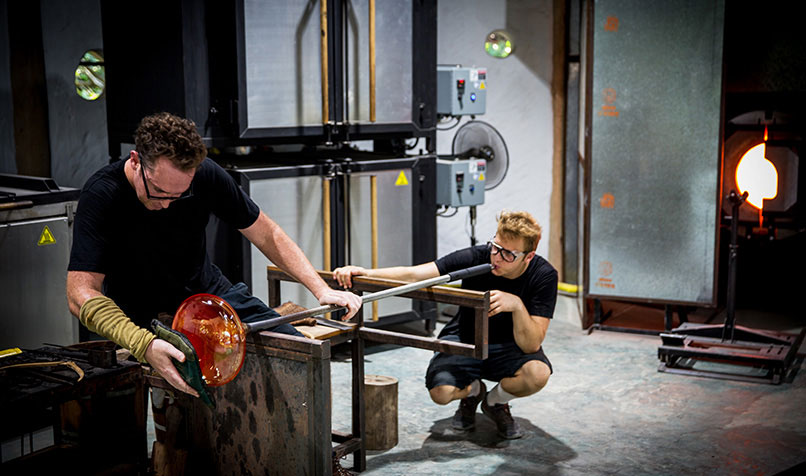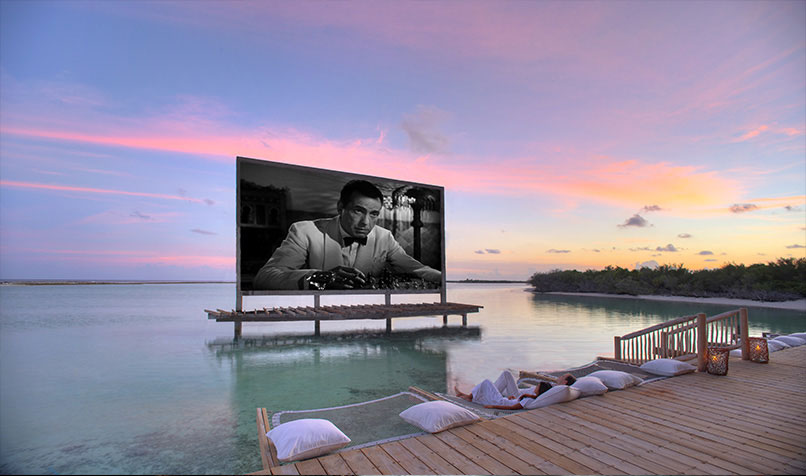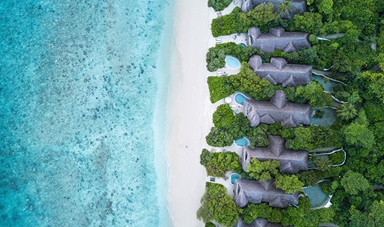Loading component...
At a glance
By Melissa Locker
The Maldives may be sinking into the ocean, but one thing that Sonu Shivdasani knows for sure is that he won’t let the chain of atolls go without a fight.
Shivdasani is the CEO of Soneva Fushi, the hotel he founded with his wife, Eva, in 1995. Together, they are on a mission to save not only their beloved adopted home of Kunfunadhoo Island, but maybe the whole planet, too.
To call Soneva Fushi an eco-friendly resort is an understatement. This is not just another crunchy-granola outpost. Rather, it’s a state-of-the-art luxury resort that is the chosen destination of the rich and the famous, and honeymooners. “We’re able to offer our guests luxuries while minimising our impact on the planet,” says Shivdasani.

Shivdasani says eco-friendliness is part of the resort’s DNA, which makes sense: why would anyone fall in love with an island only to build a resort that destroys its environment? The Shivdasanis were mindful of the environment when building the resort. “We didn’t cut any trees down. We moved buildings [and] changed the architecture slightly to fit in among the trees,” says Shivdasani, adding with a tinge of regret: “What we were doing back in 1995 would be like 20 out of 100 now in terms of all the different things we’re doing now.”
While some critics have noted that tourism can damage the island’s already fragile ecosystem – and many maintain that the archipelago’s atolls should stay undeveloped – Shivdasani is working to balance his business and his home. The hotel introduced the archipelago’s first solar array in 2008 and expects to get 75 per cent of its energy from renewables within the next 12 months. It is also on a mission to become zero-waste and carbon neutral. It currently recycles 90 per cent of its solid waste – with glass, food waste, jungle trimmings, and polystyrene all processed onsite in its own pyrolysis system.
Bold steps
The hotel, which, bear in mind, is on a secluded island in the middle of the Indian Ocean off the coast of Sri Lanka, boldly banned the use of plastic water bottles in 2008. That meant it had to come up with an alternative. Now it desalinates the water on site, playing classical music during the process. This method follows the principles of Masaru Emoto, the famed Japanese chemist who claimed that human emotion could affect water molecules. “We’re told that classical music will help,” Shivdasani explains simply.
Guests are served hotel-made desalinated water in what Shivdasani describes as “beautiful bottles with ceramic lids”. The bottles are better for guests, the environment, and for the company’s bottom line. “By using our filtered tap water instead of Evian or Vittel, our cost of water for water sales went from 20 per cent down to 2 per cent,” Shivdasani says. “All that savings has gone straight to charity.”
Of course, guests who can afford the trip to the Maldives tend to have particular tastes. Occasionally, Maldives water desalinated to the sound of classical music and served in glass bottles may not be good enough. Shivdasani shrugs it off, though: “Every year, we will get three or four guests who say, yeah, I want my mineral water and will go buy it, but that’s a very, very small percentage. Most guests love it, and it’s raised a lot of capital for good causes.”
A glass act

Getting rid of plastic bottles wasn’t enough. “We banned branded water, but you still have spirits bottles, wine bottles, and there are other resorts as well,” says Shivdasani. Inspiration struck while Shivdasani was reading an article in The Economist about a family of Venetian glassblowers. “I thought it would be great to have a state-of-the-art glass factory with the latest equipment from Italy,” Shivdasani explains.
He set up a glass factory that recycles the glass bottles produced by the hotel and its neighbours by having world-renowned glassblowers come and turn them into art. “Over three weeks [one artist] made about US$800,000 worth of glass art,” says Shivdasani. “Then we thought, ‘Well, what can we do with plastic?’.”
The answer to that turned out to be an innovative maker program dedicated to finding new uses for the plastic that washes up on the archipelago’s shores. Guests transform plastic waste into souvenirs like flower pots, bowls, and children’s toys, and the island trash slowly dwindles.
Shivdasani also thinks about the items on the dinner menus, weighing guests’ desire for Australian wagyu or Argentine beef against the environmental impact of the cattle industry (“The deforestation,” Shivdasani sighs) and the carbon footprint of flying it to the far-flung island.
The hotel measures its carbon emissions using the three-scope plan: one, direct emissions; two, indirect emissions from purchased electricity, heat or steam; and three, other indirect emissions from outsourced activities. “I’m not sure if we’re still the only group to measure all three steps of carbon, but we’re certainly the only group to have a mandatory carbon offset,” says Shivdasani. (And, yes, skeptics, offsets do seem to work, although not as well as not emitting the carbon in the first place.)
"We dont's cut any trees down. We moved buildngs..."
To afford the offsets, the hotel includes the eco-friendly measure as a percentage of the room rate. “That’s raised about US$5 or US$6 million dollars over the years,” Shivdasani explains, noting that the funds have paid for slightly subsidised energy for the island.
The hotel has also helped plant half a million trees in the north of Thailand, an idea so thrilling that Shivdasani goes off on a bit of a tangent, throwing out statistics about scarcity issues in Darfur, the food security of villages in Myanmar, and the impact of wood burning on lung disease rates. “Five million people a year are dying of lung disease, and they aren’t smoking!” he says.
Cleaner horizons

As Soneva Fushi expands to new locations – including Soneva Kiri on the Thai island of Koh Kood in 2009, and Soneva Jani in the Noonu Atoll, Maldives, in 2016 – its plans grow bigger. It just launched Soneva Surf, which it believes is the world’s first fully sustainable surf program, using eco-friendly surfboards, leashes, fins, rash guards, sunscreen, and board wax.
That’s still not enough. “We still need to get to zero carbon on our properties,” Shivdasani says. To get them there, he is thinking about aquaponics, importing an expert from Thailand to teach him how to “grow 12 different types of mushrooms”, raising chickens and eggs, and concocting a plan to reduce the energy consumption required for chilling (for ice and air conditioning). It’s a lot of work on top of the business of running a five-star resort, but Shivdasani says he’s up for the challenge.
“Oh, you know, it’s all about continuously moving forward.”
Used with permission of Fast Company 2018. All rights reserved.

